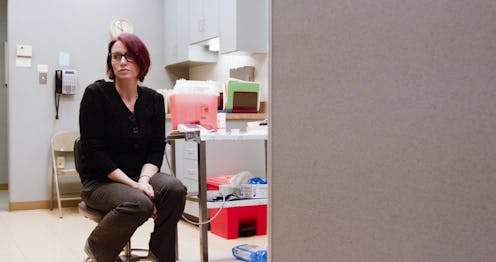Entertainment
'Abortion: Stories Women Tell' Shows What Comes Next For Many Different Women

Despite the fact that it's more common than some people may think, abortion remains a taboo topic to discuss — and that's exactly why the women who participated in HBO's Abortion: Stories Women Tell chose to speak out about terminating their pregnancies. Set in Missouri, a state where the abortion legislation is so strict that many women are forced to drive hours in order to get the procedure, the documentary depicts the variety of ways women react after having an abortion — and it provides a fair, balanced display of emotions. In addition to showing the significant roadblocks faced by women seeking abortions, Abortion: Stories Women Tell also focuses on the human element of having an abortion.
“With this film, my goal was to take a personal and up-close look at patient stories, to help lift the stigma around personal-decision making and abortion care,” said Filmmaker Tracy Droz Tragos in a statement released by Planned Parenthood.
Many Planned Parenthood centers have trained volunteer escorts who help patients get from their cars into the health center. They provide much-needed support to the women who are often distressed and distracted by the protesters who gather around the clinics to shout and hold graphic signs designed to shame women for their choices (even though some of these women are simply at Planned Parenthood to receive affordable health care). As one escort explains, she had an abortion in college and if she hadn't made the choice, she wouldn't have been able to finish her education and later have children when the time was right.
On the flip side, a pro-life woman tells filmmakers that she became an activist because she had three abortions and she now deeply regrets the decision. She claims these feelings are universal and all women who have had abortions experience them, stating that: "It's automatic. I don't care what anybody says. Everyone feels it." However, interviews with other participants in the documentary show that it's not so simple.
Having an abortion was an emotional decision for many of them — especially those who wanted a baby but chose to terminate the pregnancy when they learned the fetus' health was so poor that the baby wouldn't live past birth. But others explain that they wouldn't have the lives they do now if they'd had a baby at the wrong time. Although many pro-lifers lobby for adoption, carrying the pregnancy to term isn't an option for some women — one explains that she works as a waitress and is on her feet all day, so she couldn't physically carry a baby and work the hours she needs to support herself and her children.
Another woman who was in an abusive relationship when she became pregnant says the abortion saved her life: "If I'd had a child with that man, I would have killed myself. I averted disaster by having that abortion." Another participant says that, although she deeply regrets having unprotected sex, abortion was the best decision she's made in her life. The documentary also depicts a woman who experienced pure relief after having the procedure, saying that she's completely relieved and eager to get back to her normal life and focus on "happier things."
Still, Stories Women Tell is balanced — we have a right to choose, and we sometimes regret our decisions. Abortion isn't a hard and fast exception to this rule. The previously mentioned pro-life activist isn't the only participant who feels guilty about her abortion. Another woman, who terminated a pregnancy in between the two children she already has, stated: "I hate myself for it now." Proving that each decision can bring about regrets, another participant reluctantly gave birth and thereby had to give up a hard-earned basketball scholarship at Kentucky State University. She now says that, if she could do it all over, she would have had an abortion.
According to a 2015 study conducted by researchers at the University of California San Francisco, 95 percent of women don't regret having an abortion. Still, I give Stories Women Tell credit for showing more than one side to the issue.
In the documentary, the women who did regret the decision often cited religious beliefs as the reason they feel guilty. So, it's fitting that the final lines come from a clinic worker: "God loves everybody." Just like there's no right or wrong reason to have an abortion, there's no cookie-cutter reaction that a woman should have in the aftermath — and Stories Women Tell does an excellent job of depicting this.